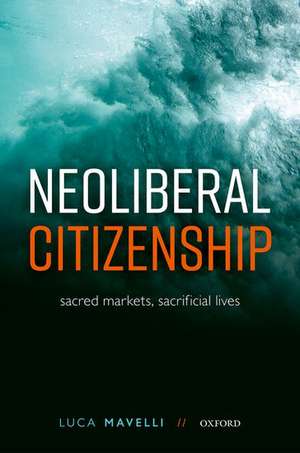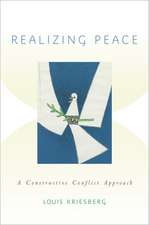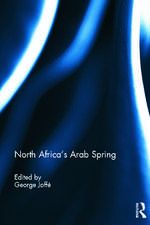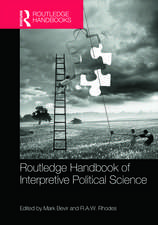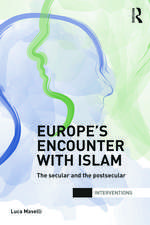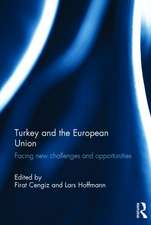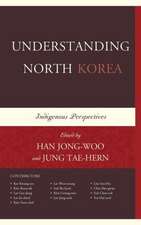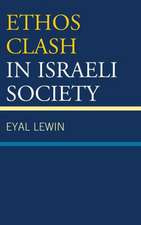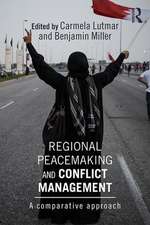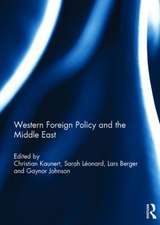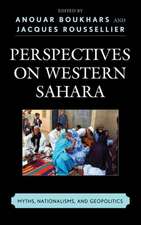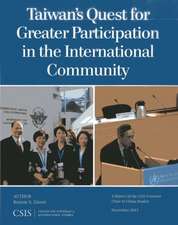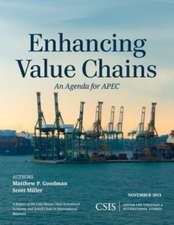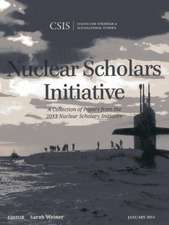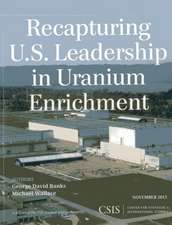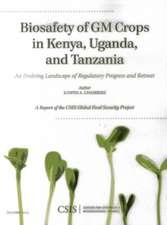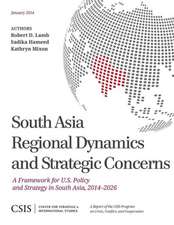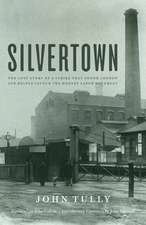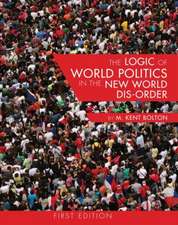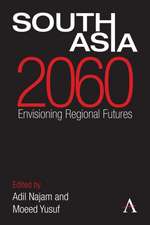Neoliberal Citizenship: Sacred Markets, Sacrificial Lives
Autor Luca Mavellien Limba Engleză Hardback – 15 feb 2022
Preț: 572.68 lei
Preț vechi: 698.39 lei
-18% Nou
Puncte Express: 859
Preț estimativ în valută:
109.58€ • 119.41$ • 92.34£
109.58€ • 119.41$ • 92.34£
Carte disponibilă
Livrare economică 02-16 aprilie
Livrare express 18-22 martie pentru 33.38 lei
Preluare comenzi: 021 569.72.76
Specificații
ISBN-13: 9780192857583
ISBN-10: 0192857584
Pagini: 304
Dimensiuni: 162 x 240 x 21 mm
Greutate: 0.61 kg
Editura: OUP OXFORD
Colecția OUP Oxford
Locul publicării:Oxford, United Kingdom
ISBN-10: 0192857584
Pagini: 304
Dimensiuni: 162 x 240 x 21 mm
Greutate: 0.61 kg
Editura: OUP OXFORD
Colecția OUP Oxford
Locul publicării:Oxford, United Kingdom
Recenzii
In this big, bold, and brash book, Luca Mavelli explores what happens when liberal citizenship transforms into neoliberal citizenship. What happens when the market determines: who can and cannot be a member? how outsiders can be treated? who can and cannot call on the state for protection - and what kind? who lives and who dies? This is a book that transcends national, comparative, and global politics - just as neoliberalism does. Highly recommended.
A rich contribution to the scholarship on neoliberalism, one that develops a powerful account of the neoliberalization of quotidian citizenship to illuminate Europe's management of migration and COVID. Mavelli's thesis on sacrificial citizenship is especially provocative.
Erudite and passionate, Mavelli brings to urgent attention the perverse and destructive contemporary forms of neoliberal rule. Charting the lives of those considered to be 'expendable', Mavelli highlights how large sections of populations are turned into sacrificial citizens irrespective of their formal citizenship status. He provides an authoritative exposition of the neoliberal 'creative destruction' of meaning, which reverses the grammar of solidarity to the effect that: 'helping the poor' becomes a way of perpetuating their debasement; rescuing migrants becomes a 'pull factor' that will cause more deaths; and prioritising the elderly risks the destruction of the economy and society. New forms of humanitarianism and solidarity are very much needed and this book will be a major contribution to this conversation.
Europe is no longer the religiously and culturally homogenised territory that it once believed it was. Impacted by the end of the Cold War, globalisation, increasing immigration, and the regional rise of right-wing populism, today's Europe faces the future with fear and trepidation. Luca Mavelli has written a remarkable book which, stimulated by the 2015 'refugee crisis', took shape following the UK's 2016 Brexit vote. Mavelli explores the 'sacred' foundations of Europe's neoliberal citizenship. Also influenced by the Global Financial, Eurozone, and Covid-19 pandemic crises, Mavelli's book is an authoritative assessment of why, three decades after the Cold War, Europe is moulded by 'post-secularity'
This is an absolutely essential read for making sense of pandemics and other recent challenges such as Europe's 'refugee crisis'. It presents an original thesis about the development of neoliberal citizenship through various practices of governance which demonstrates how the EU and other states and organisations combine a neoliberal belief in the sacredness of the market with biopolitical practices determining the sacrificial disposability of populations. This is a most compelling account of the construction of citizenship that will make a significant contribution to the field of politics and international relations.
Neoliberal citizenship is often described in terms of economization and marketization. While he acknowledges such processes, Luca Mavelli provides us with a much more detailed and nuanced picture. Eloquently playing with the multiple meanings of 'value', he convincingly shows how neoliberal citizenship blurs the boundary between economy, morals, and politics to produce hierarchies of lives that often operate regardless of formal statuses of belonging. Undocumented migrants, dispossessed citizens, and elderly in care homes during the Covid-19 pandemic populate the pages of this theoretically compelling and politically engaged work, which is ultimately crisscrossed by the desire for a post-neoliberal idea of citizenship. A must-read book in the current planetary predicament!
Neoliberal Citizenship is an original, provocative, and timely intervention. Synthesising interdisciplinary debates across political economy, migration, and security, Mavelli develops a powerful overarching argument about contemporary transformations in the concept and practice of citizenship. His unique emphasis on the emotional - as well as economic - dimensions of citizenship as a biopolitical technique of government is path-breaking. Of equal significance are the insights he offers into scarcity, the specificity of neoliberal life as the object of biopolitical care, and the multiplicity of regimes of differential inclusion. This book will leave an indelible impression on the field at large and on readers individually; I urge you to read it.
This thought-provoking book, Luca Mavelli embarks on an intellectual journey that dissects the multifaceted transformations of citizenship within the frame- work of neo-liberalism...The book offers an intellectual tour de force and an original way to understand the transformation of citizenship.
Neoliberal Citizenship carries significant theoretical implications for current research on neoliberalism, citizenship, borders and security. The book is organized around a logically structured narrative and an interdisciplinary engagement with numerous thinkers.
A rich contribution to the scholarship on neoliberalism, one that develops a powerful account of the neoliberalization of quotidian citizenship to illuminate Europe's management of migration and COVID. Mavelli's thesis on sacrificial citizenship is especially provocative.
Erudite and passionate, Mavelli brings to urgent attention the perverse and destructive contemporary forms of neoliberal rule. Charting the lives of those considered to be 'expendable', Mavelli highlights how large sections of populations are turned into sacrificial citizens irrespective of their formal citizenship status. He provides an authoritative exposition of the neoliberal 'creative destruction' of meaning, which reverses the grammar of solidarity to the effect that: 'helping the poor' becomes a way of perpetuating their debasement; rescuing migrants becomes a 'pull factor' that will cause more deaths; and prioritising the elderly risks the destruction of the economy and society. New forms of humanitarianism and solidarity are very much needed and this book will be a major contribution to this conversation.
Europe is no longer the religiously and culturally homogenised territory that it once believed it was. Impacted by the end of the Cold War, globalisation, increasing immigration, and the regional rise of right-wing populism, today's Europe faces the future with fear and trepidation. Luca Mavelli has written a remarkable book which, stimulated by the 2015 'refugee crisis', took shape following the UK's 2016 Brexit vote. Mavelli explores the 'sacred' foundations of Europe's neoliberal citizenship. Also influenced by the Global Financial, Eurozone, and Covid-19 pandemic crises, Mavelli's book is an authoritative assessment of why, three decades after the Cold War, Europe is moulded by 'post-secularity'
This is an absolutely essential read for making sense of pandemics and other recent challenges such as Europe's 'refugee crisis'. It presents an original thesis about the development of neoliberal citizenship through various practices of governance which demonstrates how the EU and other states and organisations combine a neoliberal belief in the sacredness of the market with biopolitical practices determining the sacrificial disposability of populations. This is a most compelling account of the construction of citizenship that will make a significant contribution to the field of politics and international relations.
Neoliberal citizenship is often described in terms of economization and marketization. While he acknowledges such processes, Luca Mavelli provides us with a much more detailed and nuanced picture. Eloquently playing with the multiple meanings of 'value', he convincingly shows how neoliberal citizenship blurs the boundary between economy, morals, and politics to produce hierarchies of lives that often operate regardless of formal statuses of belonging. Undocumented migrants, dispossessed citizens, and elderly in care homes during the Covid-19 pandemic populate the pages of this theoretically compelling and politically engaged work, which is ultimately crisscrossed by the desire for a post-neoliberal idea of citizenship. A must-read book in the current planetary predicament!
Neoliberal Citizenship is an original, provocative, and timely intervention. Synthesising interdisciplinary debates across political economy, migration, and security, Mavelli develops a powerful overarching argument about contemporary transformations in the concept and practice of citizenship. His unique emphasis on the emotional - as well as economic - dimensions of citizenship as a biopolitical technique of government is path-breaking. Of equal significance are the insights he offers into scarcity, the specificity of neoliberal life as the object of biopolitical care, and the multiplicity of regimes of differential inclusion. This book will leave an indelible impression on the field at large and on readers individually; I urge you to read it.
This thought-provoking book, Luca Mavelli embarks on an intellectual journey that dissects the multifaceted transformations of citizenship within the frame- work of neo-liberalism...The book offers an intellectual tour de force and an original way to understand the transformation of citizenship.
Neoliberal Citizenship carries significant theoretical implications for current research on neoliberalism, citizenship, borders and security. The book is organized around a logically structured narrative and an interdisciplinary engagement with numerous thinkers.
Notă biografică
Luca Mavelli is a Reader in Politics and International Relations at the University of Kent. He is the author of Europe's Encounter with Islam: The Secular and the Postsecular, and the co-editor of Towards a Postsecular International Politics and The Refugee Crisis and Religion. His articles have appeared in some of the leading journals of politics and international relations. His work has been funded by the UK Economic and Social Research Council and the British Council.
